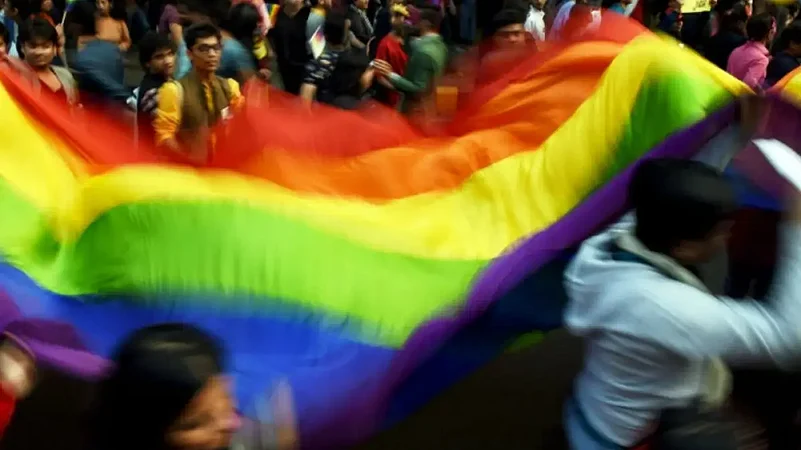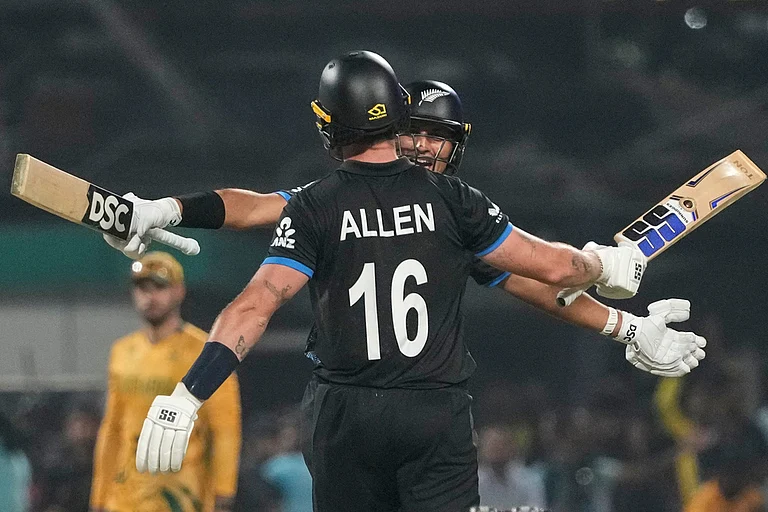Pune witnessed its annual pride walk after two years of lockdown earlier this June. People from the queer community, as well as its supporters, gathered in large numbers to celebrate the day that marked 10 years of the event.
The 2022 theme for Pune Pride was ‘traditional’ and the organisers also announced that only the rainbow flag and the Indian flag will be allowed as a part of the walk, according to 23-year-old Rishikesh Raut. The organisers would not allow either the trans flag or the Dalit flag during the event, both identities that she feels represent her, she said. “Pride parades in India want to be apolitical. Pune pride walk has especially been very problematic for years,” she added.
Raut has been told to keep her “Dalit identity at home,” and not bring it to queer events. “But I have to bring it here also because you see caste is everywhere. Even within the queer community, the only people visible are Savarna individuals. Even when we want to be visible they will not give us space,” she added.
Initially, Raut has been hesitant to call herself Dalit because of the history of oppression faced by her family. “I first started using the word Bahujan but as I met other Dalit trans individuals, I started using the word Dalit very proudly,” she said. “But even today when I introduce myself, sometimes I stop at calling myself trans and am unable to tell them I am Dalit. I fear people will think I am too much for them,” she added.
According to a report by the Centre for Law and Policy Research, Dalit transgender persons faced the most amount of violence in school and were especially vulnerable to sexual violence at work with 33 per cent reporting sexual assault and harassment at work. Dalit transgender persons also faced harassment in their interactions with police officials: 23 per cent of Dalit transgender persons were forcibly denuded or stripped by the police and 19 per cent were sexually assaulted when they approached the police seeking assistance. Dalit transgender persons faced the most barriers to access to public transport and public spaces like parks (50 per cent), police stations (46 per cent) and government hospitals (43 per cent). 56 per cent of Dalit transgender respondents were forced to engage in sexual activity to access shelter, food or gain employment.
“The ‘pride’ space in India is monopolised by upper caste people. There is an overwhelming number of upper caste queer people that organise pride parades in different cities as a part of any committee,” said Aroh Akunth, a part of the Dalit Queer Project, a network dedicated to telling stories of Dalit communities.
“So much of resource is also spent on Pride, why is that not spent on scholarship and shelters for Dalit trans people? Why can’t we help them sustain rather than doing one event every year,” they added.
In India, the first Pride Parade was held in Kolkata on 2nd July 1999, called the Kolkata Rainbow Pride Walk. Even though it saw participation from other cities like Mumbai and Bangalore, there were still only about 15 participants.
Today, Pride Parades are held in over 21 Indian cities.
“Pride as a space where the masses get together always has power and we should appreciate that but at the same time even after so many years of pride it has only proved to be a space for people to network in their own caste, then its a problem,” she said.
Since December last year, Trans and Dalit rights activists have been fighting for fair representation in the form of horizontal reservation and oppose the common categorisation of trans persons in the Other Backward Class (OBC) category as suggested by the Union Government.
The Union Government’s move to add transgender persons to the list of Other Backward Classes (OBCs) will amount to providing transgender persons ‘vertical reservations’ within the OBC category, and be detrimental to large sections of the community. “As transgender persons and community leaders, we believe that this will be a retrograde decision that will adversely affect many transgender persons from marginalised sections and deny them opportunities and benefits,” according to a statement by the Trans Right Now collective.
This neglect of caste operating within the transgender and intersex communities can be detrimental for persons from these communities who belong to marginalised sections, because it refuses to acknowledge that transgender persons who are also Dalit or Adivasi face an added historical disadvantage because of their caste and tribe status as well as discrimination, oppression and marginalisation because of their gender identity, the statement further read.
“Within this rainbow umbrella, there is a lot of caste discrimination. Trans people from Dalit and Adivasi communities do not feel safe sharing their experiences with the community,” says activist Grace Banu.
Bollywood recently awarded Banu the Grazia Millennial Award in 2022. She earlier received awards including the Behindwoods’ ‘Icon of Inspiration Award’ in 2019.
“It has been super difficult. We don't know how to book the flight, who we should meet, write or speak English, or how to react with officials. There is a huge lack of knowledge,” she said. “We have been guided by the people from our own community who have learnt to speak good English and make some space,” she added.
Grace initially started her journey as a trans-Dalit activist because she felt there was a lack of representation from that community. “There was no one to talk to about our issues. I created that safe space,” she said.
The 32-year-old also started the Trans Rights Now Collective in 2011. The focus of the group is to provide education and employment opportunities to Trans people from Dalit and Adivasi communities.





















